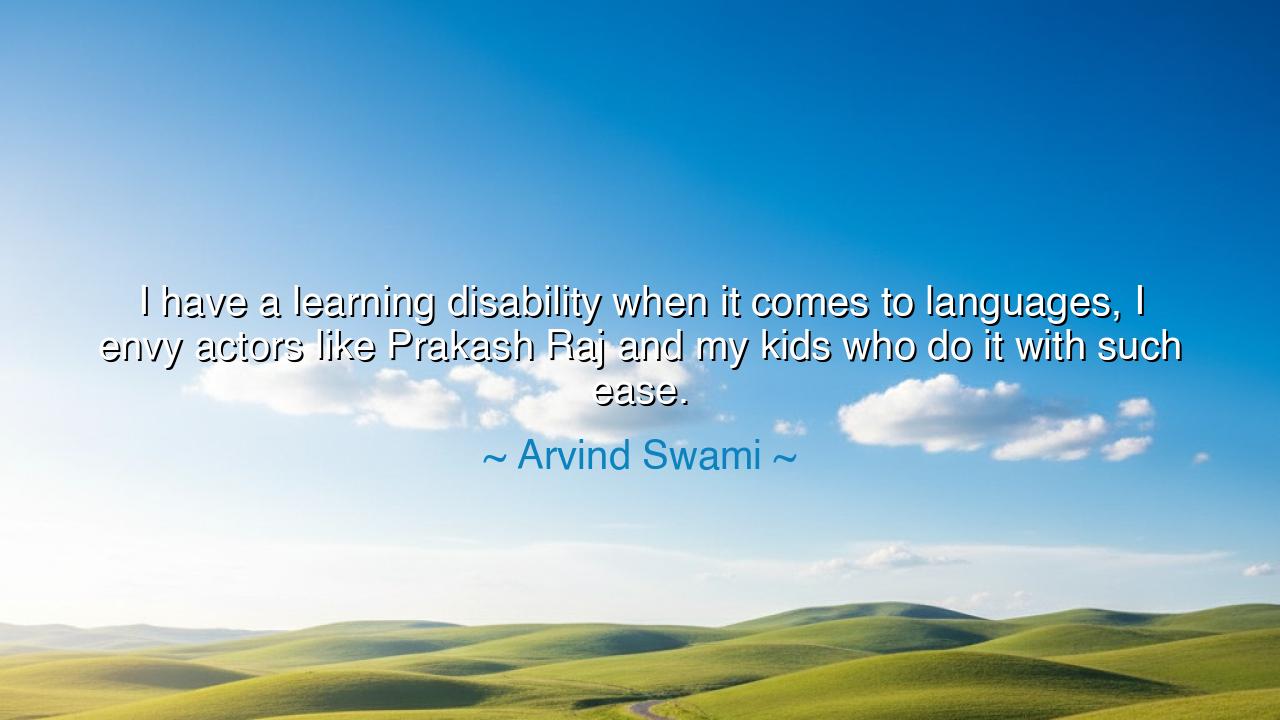
I have a learning disability when it comes to languages, I envy
I have a learning disability when it comes to languages, I envy actors like Prakash Raj and my kids who do it with such ease.






“I have a learning disability when it comes to languages, I envy actors like Prakash Raj and my kids who do it with such ease.” — Arvind Swami
In this simple and honest confession, Arvind Swami, the celebrated actor and thinker of quiet grace, reveals a truth that humbles even the most gifted among us: that learning is not always equal in its gifts, and that true mastery lies not in perfection, but in perseverance. His words are not the lament of inadequacy, but the expression of a soul aware of its limitations — and through that awareness, its strength. When he speaks of a learning disability, he acknowledges a struggle familiar to all who walk the path of growth. Yet, when he expresses envy for those who learn with ease, there is no bitterness — only admiration, and the noble humility of one who knows that every human being learns differently.
The origin of this wisdom lies in Swami’s own life, shaped by both artistry and introspection. Known for his elegance of performance and emotional depth, he is a man whose craft demands mastery over expression — voice, gesture, rhythm, and speech. To admit difficulty with language learning is, for him, to confess not weakness, but truth. He reminds us that every learner carries a different burden: what comes easily to one may be the lifelong struggle of another. Yet in acknowledging this, Swami teaches us that self-awareness is the first step toward greatness. For even the ancients held that the man who knows his weakness is wiser than the man who pretends strength.
The ancient Greeks spoke of this very virtue — the courage to confront one’s limitations. Socrates, who claimed to know nothing, was the wisest man in Athens because he dared to admit his ignorance. Likewise, Arvind Swami’s confession is an act of wisdom, not weakness. In a world that glorifies ease and talent, he honors the struggle. He teaches that learning, whether in language or in life, is not measured by speed or simplicity, but by sincerity. The one who struggles and persists learns more deeply than the one who glides through untested. For the former’s knowledge is carved through effort; it is earned, not inherited.
Consider the story of Helen Keller, who, born both blind and deaf, lived in a world of silence and darkness. Yet through the tireless guidance of her teacher Anne Sullivan, she learned to communicate — not by sound, but by touch, by pattern, by unyielding patience. The word “water,” traced into her palm, opened for her a universe of meaning. What others achieved with ease, she achieved through struggle, and her triumph became immortal. Like Swami’s reflection, her story reveals that true learning does not depend on ability alone, but on will, perseverance, and the unshakable belief that even limitation can become a form of grace.
Swami’s envy of others’ ease is the envy of the humble, not the proud. It is the recognition that talent is divine, yet the effort to learn is equally sacred. There are those who possess natural fluency, who move between languages or skills as though born for them. And there are those who must build each word, each understanding, brick by brick. Yet both serve the same truth: that learning is not a race, but a pilgrimage. Some walk swiftly, others slowly, but all who move forward partake in the same sacred act — the discovery of meaning through growth.
His words also carry a deeper teaching: that acceptance of one’s difficulty does not mean surrender. To say “I have a learning disability” is not to give up, but to claim the right to learn in one’s own way. It is a reminder that wisdom grows not from comparison, but from compassion — for oneself and for others. The one who sees his limits clearly can transform them into the very tools of strength. For in truth, the human mind is not bound by what it lacks, but by what it refuses to attempt. Swami’s reflection becomes a song of quiet perseverance, urging us to find pride not in being flawless, but in being faithful to the journey of learning.
So, dear listener, take this teaching into your own heart: do not be disheartened by your slowness, your difficulty, or your imperfection. Every soul learns according to its own rhythm. Do not envy another’s ease; instead, honor your own effort. Keep learning, as Swami does, each day, each hour — not for mastery’s sake, but for the joy of discovery. For the true learner is not the one who arrives easily, but the one who keeps walking despite the weight. And remember, as the ancients would say: the flame that burns slowly often burns the longest. Let your learning, like that flame, be steady, humble, and enduring — a light not of brilliance alone, but of persevering spirit.






AAdministratorAdministrator
Welcome, honored guests. Please leave a comment, we will respond soon